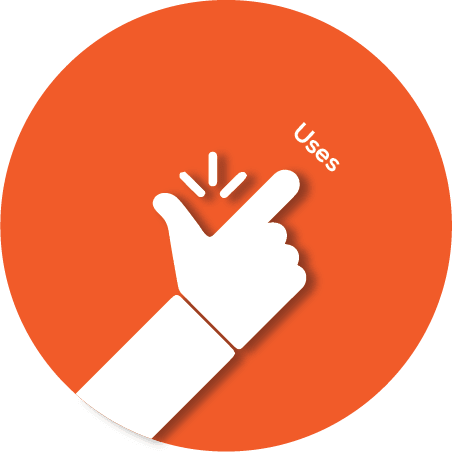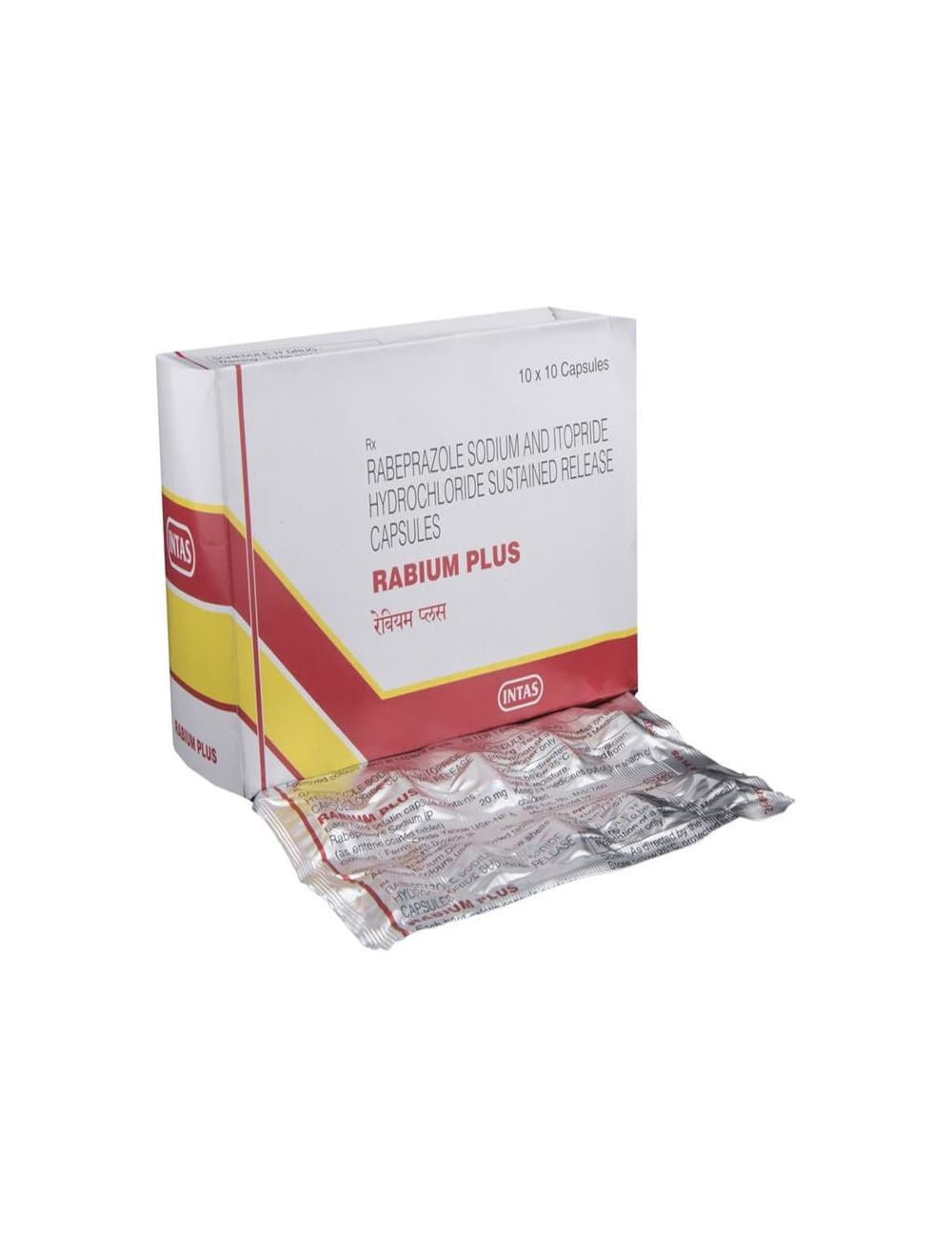Rabclear IT 20mg/150mg Capsule RABEPRAZOLE + ITOPRIDE
Rabclear IT 20mg150mg Capsule can be taken with or without food as directed by your doctor The dosage and duration of treatment will be determined by your doctor based on your condition and response to the medicine It is important to continue taking this medicine for the entire recommended duration as stopping the treatment prematurely may cause the return of symptoms and worsening of your condition Inform your healthcare team about all other medications you are taking as some may interact with or be affected by this medicine The most common side effects of Rabclear IT 20mg150mg Capsule include stomach pain diarrhea constipation headache flatulence weakness and increased saliva production These side effects are usually temporary and tend to resolve with time If you have any concerns about these side effects it is advisable to contact your doctor immediately This medicine may also cause dizziness and drowsiness so avoid driving or engaging in activities that require mental focus until you know how the medicine affects you It is recommended to avoid alcohol consumption while taking this medicine as it can exacerbate drowsiness Making lifestyle modifications such as consuming cold milk and avoiding hot tea coffee spicy food or chocolate may help in achieving better results Prior to starting this medicine inform your doctor if you have liver disease Additionally inform your doctor if you are pregnant planning pregnancy or breastfeeding


Are the medicines in combination of Itopride and Rabeprazole safe to take together?
Itopride, which is a medication used to treat stomach issues like bloating and nausea, and Rabeprazole, which is a drug that reduces stomach acid, are often used together to help with digestive problems. There are no well-documented significant drug-drug interactions between Itopride and Rabeprazole. However, it's always important to be cautious when taking multiple medications. To monitor for any potential interactions, keep an eye on any new or worsening symptoms. This could include changes in digestion, stomach pain, or unusual side effects. Regular check-ups with a healthcare provider can help ensure that the medications are working well together. If you notice anything unusual, it's important to contact your doctor right away. They can provide guidance and make any necessary adjustments to your treatment plan.

Are there harms and risks from taking combination of Itopride and Rabeprazole?
Itopride, which is used to treat gastrointestinal symptoms, commonly causes side effects like headache, dizziness, and diarrhea, which refers to loose or watery stools. Significant adverse effects may include allergic reactions, which are immune system responses to a substance. Rabeprazole, which is used to reduce stomach acid, often leads to side effects such as headache, nausea, which is a feeling of sickness with an inclination to vomit, and diarrhea. Serious adverse effects can include severe allergic reactions and liver problems, which affect the organ that processes nutrients and detoxifies the body. Both Itopride and Rabeprazole share common side effects like headache and diarrhea. However, Itopride is unique in its use for gastrointestinal motility, which refers to the movement of the digestive system, while Rabeprazole is distinct in its role in reducing stomach acid production.

Can I take combination of Itopride and Rabeprazole if I am pregnant?
Itopride, which is used to treat gastrointestinal symptoms like bloating and nausea, has limited data on its safety during pregnancy. It is generally advised to use it only if the potential benefits outweigh the risks. Rabeprazole, which is a proton pump inhibitor used to reduce stomach acid, also lacks extensive studies on its safety for pregnant women. Like Itopride, it should be used during pregnancy only if necessary. Both Itopride and Rabeprazole share the common attribute of having insufficient data regarding their safety in pregnancy, leading to cautious use. However, they are unique in their primary functions: Itopride focuses on improving gut motility, which refers to the movement of the digestive system, while Rabeprazole reduces stomach acid production. Both medications should be discussed with a healthcare provider to weigh the benefits and risks during pregnancy.

Can I take combination of Itopride and Rabeprazole while breastfeeding?
Itopride, which is used to treat stomach issues like bloating and nausea, has limited information available regarding its safety during breastfeeding. It is important to consult a healthcare provider before using it while nursing. Rabeprazole, which is used to reduce stomach acid and treat conditions like acid reflux, also lacks detailed studies on its safety for breastfeeding mothers. However, it is generally considered to have low risk due to its low levels in breast milk. Both medications share the common attribute of having limited data on their safety during lactation, making it crucial to seek medical advice. While Itopride is primarily used for digestive motility issues, Rabeprazole is used for acid-related conditions. Despite their different uses, both should be used with caution during breastfeeding, and healthcare providers can help weigh the benefits and risks.

Can I take combination of Itopride and Rabeprazole with other prescription drugs?
Itopride, which is used to treat gastrointestinal symptoms like bloating and nausea, can interact with other medications that affect the stomach's movement. Itopride may increase the effects of drugs that slow down the digestive system, leading to more side effects. Rabeprazole, which is a proton pump inhibitor used to reduce stomach acid, can interact with drugs that require a certain level of stomach acidity to be absorbed properly. Both Itopride and Rabeprazole can affect how other medications are absorbed in the stomach, but they do so in different ways. Itopride speeds up stomach emptying, while Rabeprazole reduces stomach acid. When taken together, they may alter the effectiveness of other medications. It's important to consult a healthcare provider to manage these interactions effectively.

For how long is combination of Itopride and Rabeprazole taken?
Itopride is typically used for a short duration, often a few weeks, to treat symptoms of gastrointestinal disorders like bloating and nausea. It works by increasing the movement of the stomach and intestines, which helps in digestion. Rabeprazole, on the other hand, is often used for a longer duration, sometimes several weeks to months, to treat conditions like acid reflux and ulcers. It works by reducing the amount of acid produced in the stomach. Both Itopride and Rabeprazole are used to treat digestive issues, but they work in different ways. Itopride enhances gut movement, while Rabeprazole reduces stomach acid. They are both taken orally and are generally well-tolerated. However, the specific duration of use for each medication should be determined by a healthcare provider based on individual needs and conditions.

How does combination of Itopride and Rabeprazole work?
Itopride works by increasing the movement of the stomach and intestines, which helps move food through the digestive system more quickly. It does this by blocking dopamine receptors, which are proteins that can slow down gut movement, and by increasing the release of acetylcholine, which is a chemical that stimulates muscle contractions in the gut. Rabeprazole, on the other hand, works by reducing the amount of acid produced in the stomach. It does this by blocking the proton pump, which is a part of the stomach cells that releases acid. Both Itopride and Rabeprazole help with digestive issues, but they do so in different ways. Itopride focuses on improving gut movement, while Rabeprazole reduces stomach acid. They both aim to relieve symptoms like bloating and discomfort, but they target different aspects of the digestive process.

How does one take combination of Itopride and Rabeprazole?
Itopride, which is used to treat gastrointestinal symptoms like bloating and nausea, should be taken before meals. This helps it work more effectively by speeding up stomach emptying. Rabeprazole, which is used to reduce stomach acid and treat conditions like acid reflux, is usually taken before eating as well, often in the morning. Both medicines should be taken with a glass of water. There are no specific food restrictions for either medicine, but it's generally a good idea to avoid foods that trigger your symptoms, like spicy or fatty foods. Both Itopride and Rabeprazole work to improve digestive health, but they do so in different ways. Itopride enhances stomach movement, while Rabeprazole reduces acid production. Always follow your healthcare provider's instructions when taking these medications.

How do I know if combination of Itopride and Rabeprazole is working?
The benefit of Itopride, which is a medicine used to treat symptoms of stomach disorders like bloating and nausea, is measured by its ability to improve stomach movement and reduce these symptoms. Itopride works by increasing the movement of the stomach and intestines, which helps in faster digestion. Rabeprazole, which is a medicine used to treat acid reflux and stomach ulcers, is assessed by its effectiveness in reducing stomach acid production. This helps in healing ulcers and relieving symptoms like heartburn. Both Itopride and Rabeprazole are assessed by their ability to improve digestive health and relieve discomfort. They share the common goal of improving stomach function, but they work in different ways. Itopride enhances stomach movement, while Rabeprazole reduces acid production. Together, they can provide comprehensive relief for various stomach-related issues.

How do I store combination of Itopride and Rabeprazole?
Itopride and Rabeprazole do not require refrigeration. Both medicines should be stored at room temperature, which means keeping them in a place that is not too hot or too cold, usually between 68°F and 77°F (20°C and 25°C). They should be kept away from direct sunlight and moisture, so a dry place like a cabinet is ideal. Itopride, which is used to treat stomach issues like bloating and nausea, should be kept in its original packaging to protect it from light. Rabeprazole, which helps reduce stomach acid and treat conditions like acid reflux, should also be stored in a dry place. Both medicines share the common attribute of needing to be kept out of reach of children to prevent accidental ingestion. Always check the packaging for any specific storage instructions provided by the manufacturer.

How effective is combination of Itopride and Rabeprazole?
Itopride is a medication used to treat symptoms of gastrointestinal disorders, which are conditions affecting the stomach and intestines. It works by increasing the movement of the stomach and intestines, helping to relieve symptoms like bloating and nausea. Rabeprazole, on the other hand, is a proton pump inhibitor, which is a type of drug that reduces the amount of acid produced in the stomach. It is used to treat conditions like gastroesophageal reflux disease (GERD), which is a long-term condition where stomach acid comes up into the esophagus. Both Itopride and Rabeprazole are effective in treating digestive issues, but they work in different ways. Itopride enhances gut motility, which means it helps the stomach and intestines move food along. Rabeprazole reduces stomach acid, which helps prevent acid-related damage to the stomach lining and esophagus. Together, they can provide comprehensive relief for digestive problems by addressing both motility and acid production.

How long does it take for combination of Itopride and Rabeprazole to work?
The time it takes for a combination medicine to start working depends on the individual medicines it contains. For example, if the combination includes ibuprofen, which is a pain reliever and anti-inflammatory drug, it typically starts working within 20 to 30 minutes. If it includes paracetamol, which is another pain reliever, it usually begins to work within 30 to 60 minutes. Both medicines are used to relieve pain and reduce fever, which means they share these common attributes. However, ibuprofen also reduces inflammation, which is swelling and redness, while paracetamol does not. When combined, these medicines can provide a broader range of relief, addressing both pain and inflammation more effectively. Always follow the dosage instructions provided by your healthcare provider or the medicine's packaging.

What disease or symptom is combination of Itopride and Rabeprazole used for?
Itopride is used to treat symptoms of gastrointestinal disorders, which are conditions affecting the stomach and intestines, such as bloating, nausea, and heartburn. It works by increasing the movement of the stomach and intestines, which helps in the digestion process. Rabeprazole is used to treat conditions like gastroesophageal reflux disease (GERD), which is a long-term condition where stomach acid comes up into the esophagus, and ulcers, which are sores on the lining of the stomach or intestines. It works by reducing the amount of acid the stomach makes. Both Itopride and Rabeprazole help with digestive issues, but they work in different ways. Itopride enhances stomach movement, while Rabeprazole reduces stomach acid. They are often used together to provide comprehensive relief from digestive symptoms.

What is combination of Itopride and Rabeprazole?
Itopride is commonly used to treat symptoms of gastrointestinal disorders, which are conditions affecting the stomach and intestines, by enhancing stomach motility, which means it helps the stomach muscles move food through the digestive tract. Rabeprazole is used to treat conditions like acid reflux, which is when stomach acid flows back into the esophagus, by reducing the amount of acid produced in the stomach. Both medications help improve digestive health but work in different ways: Itopride increases movement in the digestive tract, while Rabeprazole decreases stomach acid production. They share the common goal of alleviating discomfort related to digestive issues.

What is the usual dose of combination of Itopride and Rabeprazole?
The usual adult daily dose for Itopride, which is a medicine used to treat gastrointestinal symptoms like bloating and nausea, is typically 150 mg, taken as 50 mg three times a day before meals. Itopride works by increasing the movement of the stomach and intestines, which helps in digestion. Rabeprazole, which is a medicine used to reduce stomach acid, is usually taken as a 20 mg dose once daily. It helps treat conditions like gastroesophageal reflux disease (GERD), which is a condition where stomach acid frequently flows back into the tube connecting your mouth and stomach. Both Itopride and Rabeprazole are used to treat digestive issues, but they work in different ways. Itopride enhances stomach movement, while Rabeprazole reduces acid production. They share the common goal of improving digestive health and relieving discomfort.

Who should avoid taking combination of Itopride and Rabeprazole?
Itopride, which is used to treat gastrointestinal symptoms like bloating and nausea, should not be used by people with a known allergy to it. It can cause side effects like diarrhea and abdominal pain. Rabeprazole, which reduces stomach acid to treat conditions like GERD, should be avoided by those allergic to it or similar drugs. It may cause headaches and dizziness. Both drugs should be used cautiously in people with liver problems, as they can affect liver function. Pregnant or breastfeeding women should consult a doctor before using either medication. It's important to follow the prescribed dosage and not to mix these drugs with alcohol, as it can increase side effects. Always inform your healthcare provider about any other medications you are taking to avoid interactions.













.svg)
